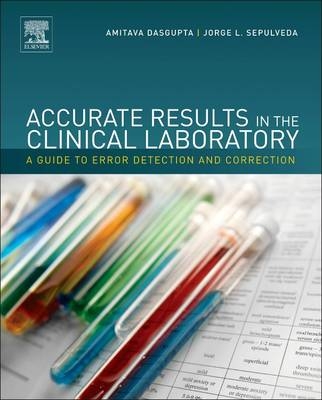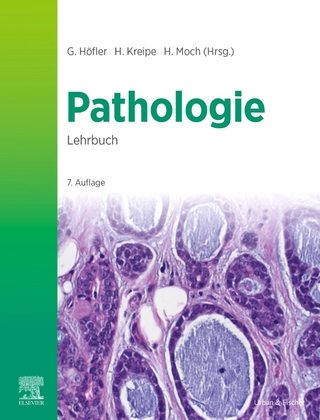
Accurate Results in the Clinical Laboratory
Elsevier Science Publishing Co Inc (Verlag)
978-0-12-415783-5 (ISBN)
- Titel erscheint in neuer Auflage
- Artikel merken
This practical, easy-to-use guide, named to Doody’s Core Titles 2013, addresses interference issues in all laboratory tests, including patient epigenetics, process of specimen collection, enzymes, biomarkers. Clinicians and laboratory scientists can therefore rely on one reference which speaks to both their needs of accurate specimen analysis and optimal patient care.
Erroneous hospital and pathology laboratory results can be confusing and problematic, especially in acute care situations. While some factors creating interference, can be identified in the laboratory, detecting many others is often dependent on clinical details unavailable to the laboratory scientists or pathologists. Therefore, clinicians must become proficient in identifying such erroneous reports, and working with pathologists and laboratory scientists so that they can understand the source of such interferences, correct the results, and then decide what course of action must be followed for proper patient management.
Amitava Dasgupta received his Ph. D in chemistry from Stanford University and completed his fellowship training in Clinical Chemistry from the Department of Laboratory Medicine at the University of Washington School of Medicine at Seattle. He is board certified in both Toxicology and Clinical Chemistry by the American Board of Clinical Chemistry. Currently, he is a tenured Full Professor of Pathology and Laboratory Medicine at the University of Kansas Medical Center and Director of Clinical Laboratories at the University of Kansas Hospital. Prior to this appointment he was a tenured Professor of Pathology and Laboratory Medicine at the University of Texas McGovern medical School from February 1998 to April 2022. He has 252 papers to his credit. He is in the editorial board of four journals including Therapeutic Drug Monitoring, Clinica Chimica Acta, Archives of Pathology and Laboratory Medicine, and Journal of Clinical Laboratory Analysis. Jorge Sepulveda received his M.D. from the University of Lisbon, Portugal, and his residency training in Laboratory Medicine and Ph.D. degree in Cell and Molecular Biology from Baylor College of Medicine, Houston, Texas. He is board certified by the American Board of Pathology in Clinical Pathology and Transfusion Medicine. He has published over 35 research articles, review papers and book chapters, and serves as Associate Editor for the Archives of Pathology and Laboratory Medicine. Dr. Sepulveda has broad experience in laboratory medicine as medical director of various clinical laboratories, including at the Houston and Philadelphia Veterans Affairs Medical Centers and at the University of Pittsburgh Presbyterian and Shadyside Hospitals, and currently serves as Associate Medical Director of the Clinical Laboratories at the Columbia University Medical Center Campus of New York-Presbyterian Hospital.
Chapter 1. Variation, Errors, and Quality in the Clinical Laboratory
Chapter 2. Effect of Age, Gender, Diet, Exercise and Ethnicity on Laboratory Test Results
Chapter 3. Effect of patient preparation, specimen collection, anticoagulants and preservatives on laboratory tests
Chapter 4. Sample processing and specimen misidentification issues
Chapter 5. Hemolysis, lipemia and high bilirubin: effect on laboratory tests
Chapter 6. Immunoassay design and mechanism of interferences
Chapter 7. Effect of herbal remedies on clinical laboratory tests
Chapter 8. Challenges in routine clinical chemistry: analysis of small molecules
Chapter 9. Challenges in routine clinical chemistry: proteins and enzymes
Chapter 10. Sources of inaccuracy in biochemical genetics analysis
Chapter 11. Challenges in endocrinology testing
Chapter 12. Pitfalls in tumor marker testing
Chapter 13. Issues of interferences in therapeutic drug monitoring
Chapter 14. Limitations of drugs of abuse testing
Chapter 15. Challenges in confirmation testing for drugs of abuse
Chapter 16. Alcohol determination using automated analyzers: limitations and pitfalls
Chapter 17. Pre-analytical issues and interferences in transfusion medicine tests
Chapter 18. Critical issues in immunology and serology testing
Chapter 19. Sources of errors in hematology and coagulation testing
Chapter 20. Challenges in Clinical Microbiology Testing
Chapter 21. Sources of errors in molecular testing
Chapter 22. Problems in Pharmacogenomics Testing
| Sprache | englisch |
|---|---|
| Maße | 216 x 276 mm |
| Gewicht | 1280 g |
| Themenwelt | Medizin / Pharmazie ► Medizinische Fachgebiete ► Laboratoriumsmedizin |
| Studium ► 2. Studienabschnitt (Klinik) ► Pathologie | |
| Naturwissenschaften ► Biologie | |
| ISBN-10 | 0-12-415783-1 / 0124157831 |
| ISBN-13 | 978-0-12-415783-5 / 9780124157835 |
| Zustand | Neuware |
| Haben Sie eine Frage zum Produkt? |
aus dem Bereich



